Major Suman Gawani, who served as a UN Peacekeeper in South Sudan, is the first Indian to receive the UN Military Gender Advocate of the Year Award.
'On seeing the Indian flag on my uniform,' she says,' the locals would get very excited and say, 'Hindi, Hindi'.'
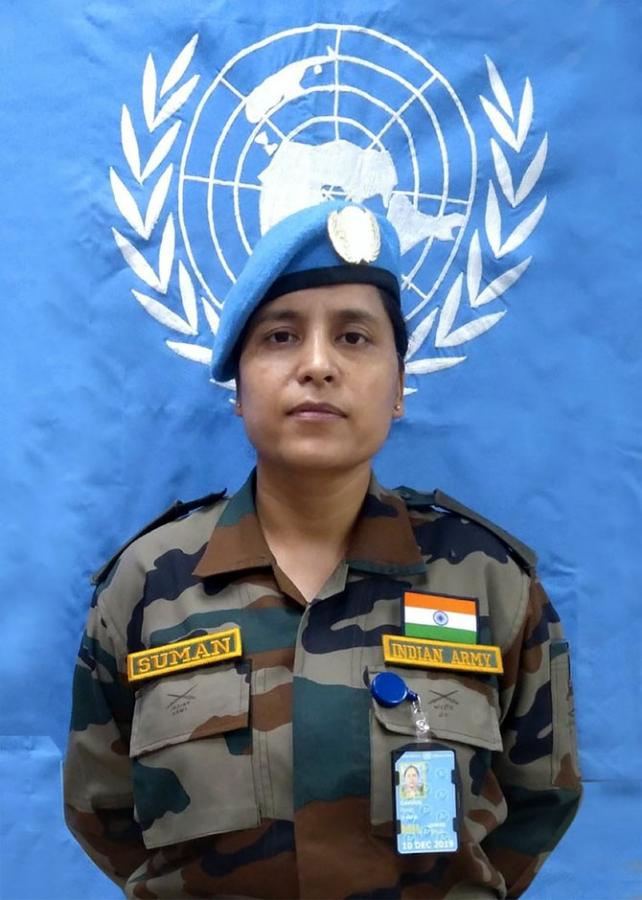
On the night of May 29, as the work day was beginning in New York and ending in New Delhi, Major Suman Gawani of the Indian Army received the UN Military Gender Advocate of the Year Award from United Nations Secretary-General Antonio Guterres in an online ceremony.
"When citizens, especially women in regions of conflict, see UN peacekeepers from different countries coming to their country to work for peace they see hope in us," Major Gawani tells Archana Masih/Rediff.com -- giving us an account of her life-changing experience as a peacekeeper in one of the world's most conflict-torn regions -- an hour before receiving the award.
Major Gawani shared the award with Commander Carla Monteiro de Castro Araujo from Brazil.
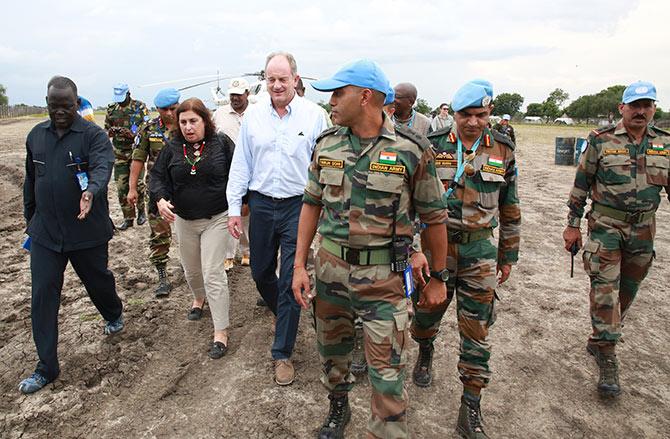
The officer hails from Tehri Garhwal in Uttarakhand and is the first Indian Peacekeeper to receive the award.
She returned to India in December 2019 after serving a one-year tenure in South Sudan which gained independence from the north in 2011 after decades of civil war.
South Sudan is the world's youngest country and has been wracked with conflict since its independence.
"Nobody likes conflict, everyone wants peace, prosperity, access to food, schools for their kids and a safe environment. This is what locals told us they wanted of their country," says Major Gawani who joined the Indian Army in 2011. Her younger brother is an officer in the Indian Air Force.
"South Sudan is a beautiful country with a very welcoming people. Life is tough and they work very hard to make ends meet. They love Indians and used to be very excited seeing the Indian flag on my uniform. 'Oh, you are Indian. Hindi, Hindi', they would say," she recalls.
Around 1,000 Indians live and work in South Sudan, mostly involved in businesses like hotels, supermarkets. Some work in oil companies.
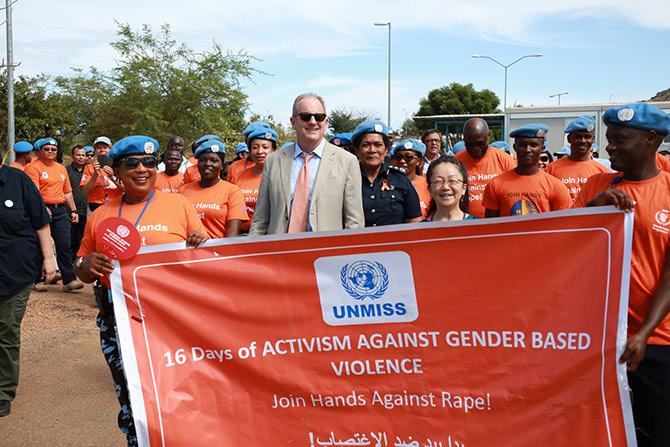
Deployed as a military observer in the UN Mission, Major Gawani trained over 230 fellow observers on conflict-related sexual violence, and ensured the presence of women military observers in each of the Mission's team sites.
Military observers are considered the eyes and ears of the ground.
Major Gawani attended a course on sexual violence in Nairobi, Kenya, before mentoring observers during their induction into the mission.
"Our efforts have resulted in the Sudanese government launching the action plan on conflict related sexual violence. Other changes will also be seen in the long run," says the officer who also held training seminars for women officers of South Sudan armed forces.
"The UN is asking all member States to send more women. The aim is to have 50% women in peacekeeping and the UN is steadily achieving it," she says.
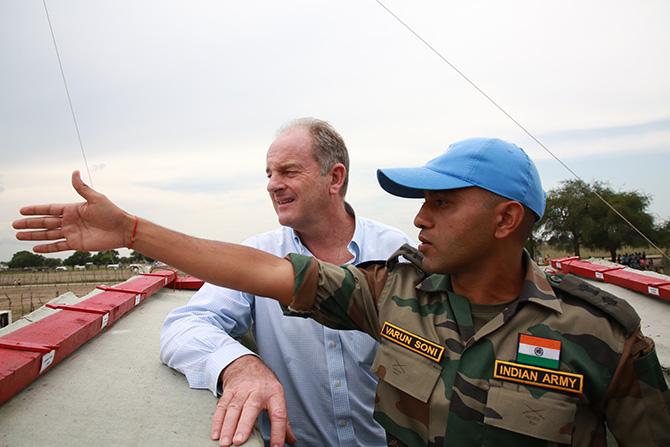
The UN Mission in South Sudan had 37 women officers and peacekeepers from 52 nations.
"Women have the ability to reach deeper into the society and bring a sense of security to survivors of conflict," says Major Gawani.
"The women who leave their children and come out to serve for peacekeeping really have a big heart," says Major Gawani, the daughter of a retired employee of the Uttarakhand Fire Services department.
"But once you reach the peacekeeping mission, the challenges are the same for men and women," asserts the major.
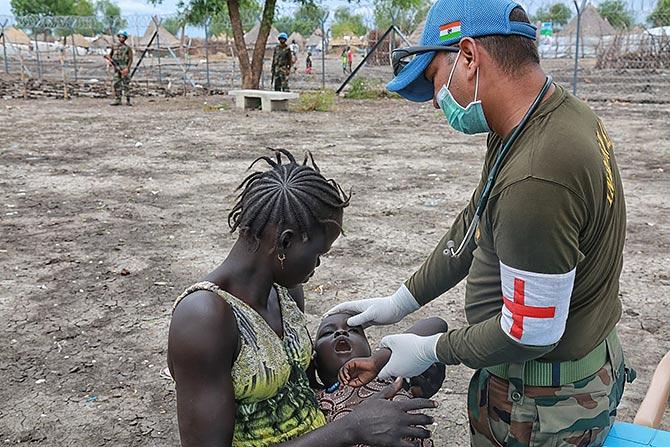
The challenges in South Sudan with a large displaced population, include accessibility to areas, road connectivity, weather -- it rains for half the year, making the land difficult for cultivation. According to the BBC, 60% of the population struggles for food every day.
"In the villages, we needed interpreters and at times people are uncomfortable talking to you because you are an outsider. In towns people understood English," she says.
There are around 2,400 Indian military and police personnel deployed as UN Peacekeepers in South Sudan. UN military observers are unarmed personnel who have to be unbiased in a conflict towards any conflicting party.
Major Gawani's role in South Sudan included patrolling, investigation and reporting.
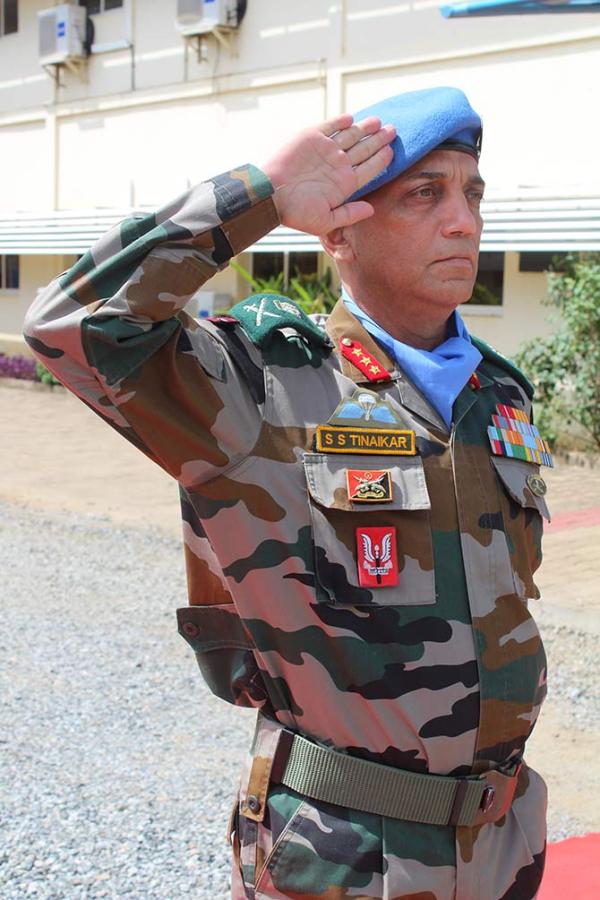
General Tinaikar, an Indian Military Academy alumnus, is the son of the late Sadashiv S Tinaikar, the former IAS officer who served as Mumbai's municipal commissioner in the 1980s. Photograph: The United Nations
The Force Commander of the UN Mission in South Sudan is Lieutenant General Shailesh S Tinaikar, the first Indian officer to be in charge of international forces deployed in South Sudan for peacekeeping operations.
Apart from peacekeeping operation, the two Indians battalions stationed in the country have conducted several welfare programmes for the locals like organising workshops on making dairy products, tailoring, bee farming to enable them to earn a livelihood.
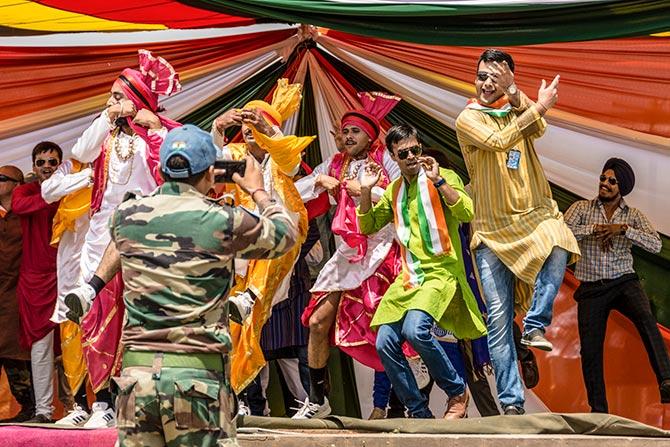
Indian personnel have constructed roads, installed hand pumps, solar lights. Medics from the Indian field hospital in Malakal also taught cycling to girls at a UN protection site.
Since there were just three cycles and many enthusiastic learners, they team organised a run to raise money for 12 cycles and helmets.

In a country ravaged by conflict and rebel groups, UN Peacekeepers in the frontlines operate in a dangerous environment. Two Indian soldiers -- Major Ravi Inder Singh Sandhu and Sergeant Lal Manotra Tarsem -- laid down their lives in the line of duty in South Sudan last year.
Along with three Indian Peacekeepers, Major Singh and Sergeant Tarsem were posthumously awarded medals at the same virtual ceremony as Major Gawani on May 29.
"There are risks in any conflict zone. Peacekeepers are vulnerable to attacks by rebels in your camp or while on patrol, which are mostly on foot or vehicles," says Major Gawani, who had a gun pointed at her at a security checkpoint while going for a medical evacuation one night.
She and her colleague were unarmed and were allowed to go after they explained their situation.
"Another risk is lack of medical facilities. Lack of connectivity makes evacuation difficult sometimes," she adds.
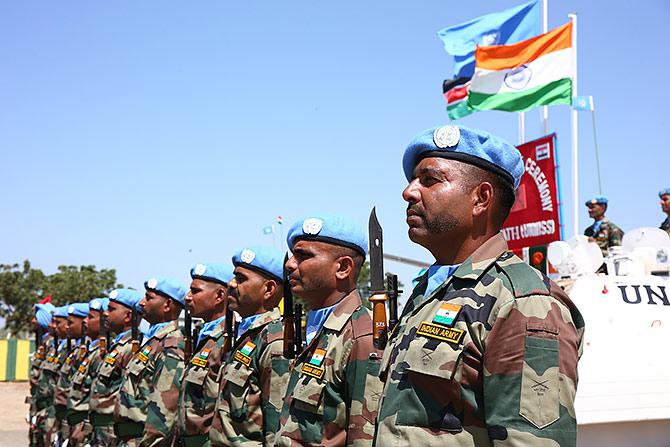
With peacekeepers from 52 nations stationed in South Sudan, the international tenure gave Major Gawani the opportunity to work with soldiers from Canada, Sweden, Australia, Bangladesh, Nepal, China, Vietnam, Ethiopia, Ghana, Rwanda, Sri Lanka.
"I made great friendships and was exposed to different work cultures which teaches you the virtues of diversity and patience. In an international work environment where everyone is different, one has to work as a team which is the most important aspect of the military," she says.
While her parents and course-mates logged onto UN TV to watch the ceremony and hear her acceptance speech, Major Gawani says working as a peacekeeper has been a life-changing experience.
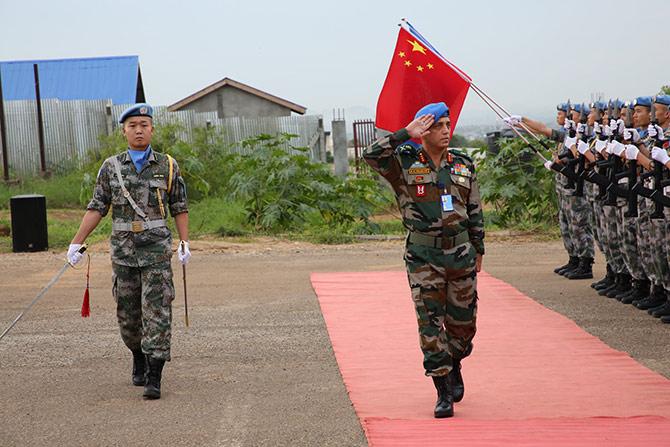
Major Gawani had always wanted to join the Indian Army, attended rallies as a student that introduced young people to fauji careers and was selected on her fourth attempt.
"This UN honour comes with a great responsibility," she says.
On what she misses most about her stint in South Sudan, she says, "I miss meeting and talking to the women in the remote villages."
SEE: Major Suman Gawani receives the UN Military Gender Advocate of the Year 2019 Award
Video Production: Hitesh Harisinghani/Rediff.com
Production: Aslam Hunani/Rediff.com








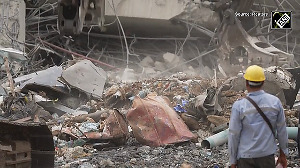

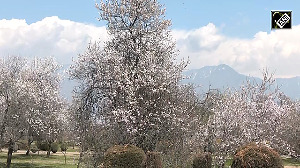
 © 2025
© 2025